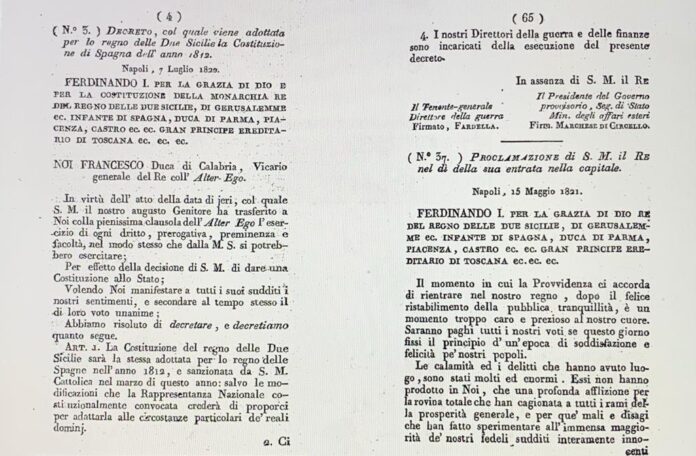
Before the 2020 is over, it is good to remember what happened two hundred years ago in Naples. On 7 July 1820, the Italian Carbonari and in particular the Southern Italian ones, led by Guglielmo Pepe, managed to obtain from Ferdinand I King of the kingdom of the two Sicilies, through his son Francesco, the first Constitution applied on Italian soil, with the establishment of a Parliament in support of the king. The revolt began on July 2,1820 with the desertion of two lieutenants (Morelli and Salvati) and 127 other sergeants and soldiers of the Bourbon army. Moreover, the priest Luigi Menichini and many Carbonari joined the rebellion, shouting: “Long live God! Long live the king! Long live the Constitution! Since the meaning of the political motto was not well understood by the inhabitants of the villages and suburbs with sectarian paths, everyone found in it what they most desired. The popular masses always need a voice to unite. The more sacred and of universal interest the guiding word for the revolt is, the more effective it is. The name of God is always the most powerful to move people.”(History of the revolution of Naples in 1820. Mariano Lombardi edit. Naples 1864).
The Constitution lasted only a year. On March 24, 1821 it was revoked by the king himself, after the Austrian army, strongly wanted by him, entered Naples. However, those first uprisings and that first glimmer of recognition of a liberal regime represent an extraordinary episode of collective aspiration for freedom and unification of our country. This event gave rise to other revolts in 1821 in Alessandria and Turin, all repressed, up to get to the wars of independence.
Thus, after fragmentations and divisions that lasted fifteen hundred years, the unification of Italy was achieved in 22 years, from 1848 to 1870 with the capture of Rome. This exciting result has rightly fueled the myth of the Italian Risorgimento, which still today is the best part of our national history.
This result began in the Neapolitan uprisings of 1820, to which the best southern intellectual forces contributed. However, after the unification of 1870, Italy was less capable and less courageous. The serious socio-political and economic repercussions especially in the south have pushed Gaetano Salvemini to say: “If Italy had experienced another thirty years of economic, intellectual and political progress, southern Italy would also have entered the area of ’civilization’. Those thirty years were missing. The First World War came” (G. Salvemini. The revolution of the rich. Bollati Boringhieri 2020).







